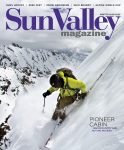The Wood River Valley attracts all types: retired executives, eternal ski bums, recent college graduates eschewing the “real world” for at least another year, and the myriad other professionals, service workers and entrepreneurs who are drawn to the mountains and the opportunities that lie within. And without fanfare, a small but growing number of residents with similar backgrounds—namely, the most elite of the nation’s military—have also found their way to this slice of paradise for a hard-earned reprieve from their service to the country.
Monty Heath is one of at least three recently retired Navy SEALs who have made the Wood River Valley home over the past few years, all of whom were drawn by the possibility of exploring a passion for the outdoor world. For Heath, this means hiking, floating the river with his two boys and dirt biking.
Needless to say, this is a big change from his time in the Navy—over a decade—which included seven overseas deployments, three of which were to Afghanistan after September 11, 2001. However, Heath continued to help other soldiers, only now it is as director of military programs for the nonprofit organization Higher Ground Sun Valley.
While the move from the Navy to Higher Ground seems like a logical step, the initial path for Heath to SEAL Team Six, arguably the U.S. military’s most elite fighting force, was much less apparent to Heath at the time.
The 40-year-old Heath readily admits that he had a tough upbringing, split between Massachusetts and New Hampshire, where he started drinking at a young age and, without any role models, began getting into trouble. And while he didn’t make much of an effort in school, he did excel at swimming during high school, which led him to his first important goal: “I saw myself as a SEAL, I just hadn’t had the training yet,” said Heath of his mindset when he enlisted in the Navy at the age of 18. He had a contract to go right into Basic Underwater Demolition/SEAL (or BUDS) training, the 24-week course that includes the infamous “Hell Week.”
That mindset helped Heath get through what is considered one of the toughest physical and mental challenges known, one that he nearly didn’t overcome.
“If you want it 95 percent, you’re not going to make it,” Heath said, noting that he got “rolled back” after failing a “drown-proofing test,” but was able to start over with the next class.
Once through the training, Heath joined the SEAL teams and deployed to Germany and Bosnia, with the objective of those latter missions being to hunt down war criminals from the Yugoslav wars in the 1990s, capturing and bringing them to The Hague to stand trial. After the attack on the World Trade Center, however, the focus shifted drastically.
“We knew we’d be going to war soon,” Heath said.
By that point, Heath had made it onto the prestigious SEAL Team Six, one of the foremost counter-terrorism forces in the world, which requires a minimum of five years on the regular SEAL teams and then six more months of intensive combat training for a vast variety of environments. As soon as he was finished with this training, he headed to the Middle East, where he would spend approximately four months during each deployment.
For Heath, his first deployment on SEAL Team Six began in January of 2002. It started out well, until the third month, when the first SEAL was killed in Afghanistan.
“It was an eye opener because we realized we weren’t invincible,” Heath said.
After two more deployments and his marriage in 2003, Heath decided it was time to get out, especially if he was going to have children. After running a resort in Nevada, he happened upon Sun Valley, in part due to Erin Rheinschild, the director of philanthropy for Higher Ground. As luck would have it, the nonprofit had an opening that fit his interests and a budding passion for helping those who shared his background.
“It’s awesome to give back to veterans. These guys and gals show up in tough shape and by the end of a week being here, they leave wanting to help other veterans themselves,” Heath said of the impact of Higher Ground’s programming, which includes outdoor activities like Nordic and alpine skiing, sled hockey, fly fishing and whitewater rafting. “It’s therapeutic recreation, and we help show (vets) how to take these activities moving forward. People need to have passions and need to do activities for their mental and physical health.”
While that might not be a surprise for people living here, Heath said, it can be life changing for the veterans who come to the Valley to participate.
For Heath, the lessons learned during one of the most intense military experiences imaginable carry over into his life as a civilian and every job he’s had after leaving the service.
“It’s all about attitude and choice. You can decide if it’s going to be a horrible day or a good day—if you’re going to look at other people with envy, or, instead, increase your own skills and attitude,” Heath said. “Being in the SEALs helped me create a growth mindset in which any obstacle is irrelevant, you just get through it.”

